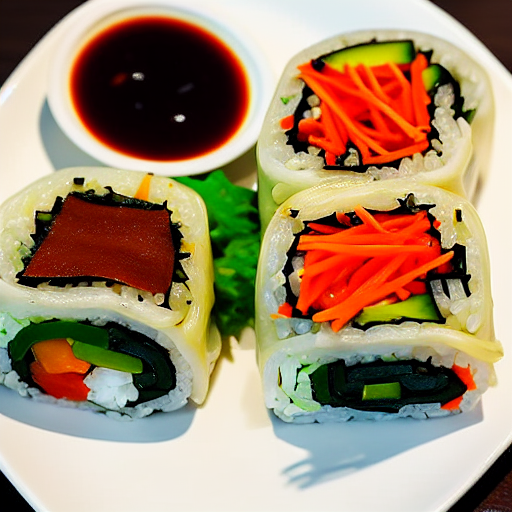Vegetable Kimbap
Vegetable Kimbap is a vibrant and nutritious Korean roll filled with a variety of fresh vegetables, perfect for a quick and healthy breakfast. This delightful dish is not only visually appealing but also packed with flavors and essential nutrients.

30 minutes
Difficulty: Medium
Korean
300 kcal
Ingredients
- Cooked sushi rice - 1 cup
- Rice vinegar - 1 tablespoon
- Sugar - 1 teaspoon
- Salt - 1/2 teaspoon
- Nori sheets - 4 sheets
- Carrot - 1 medium, julienned
- Cucumber - 1/2 medium, julienned
- Spinach - 100 grams, blanched
- Pickled radish - 50 grams, cut into strips
- Sesame oil - 1 tablespoon
- Sesame seeds - 1 teaspoon
- Soy sauce - for serving
Steps
- Rinse the sushi rice under cold water until the water runs clear, then cook according to package instructions. Once cooked, let it cool slightly.
- In a small bowl, combine rice vinegar, sugar, and salt. Heat gently until sugar dissolves, then mix into the warm rice until evenly coated.
- Prepare the vegetables: julienne the carrot and cucumber, blanch the spinach in boiling water for 30 seconds, and then rinse with cold water.
- Lay a sheet of nori on a bamboo mat or clean surface, shiny side down. Spread about 1/4 of the seasoned rice evenly over the nori, leaving a 2 cm border at the top.
- Arrange a small amount of each vegetable (carrot, cucumber, spinach, and pickled radish) in a line across the rice, about 1/3 of the way up from the bottom.
- Drizzle a little sesame oil over the vegetables and sprinkle with sesame seeds.
- Starting from the bottom, roll the kimbap tightly away from you, using the bamboo mat to help. Moisten the top edge of the nori with a little water to seal the roll.
- Repeat the process with the remaining nori sheets and filling ingredients.
- Once all rolls are made, slice each roll into bite-sized pieces with a sharp knife, wetting the knife to prevent sticking.
- Serve the kimbap with soy sauce for dipping.
Nutrition
- Calories: 300
- Protein: 6 g
- Carbs: 55 g
- Fiber: 4 g
- Sugar: 2 g
- Sodium: 350 mg
- Cholesterol: 0 mg
- Total Fat: 5 g
- Saturated Fat: 0.5 g
- Unsaturated Fat: 4.5 g
- Water: 0.2 L
Health Benefits
- Rich in vitamins and minerals from fresh vegetables.
- High in dietary fiber, aiding digestion and promoting fullness.
Tags
KoreanVegetarianBreakfast